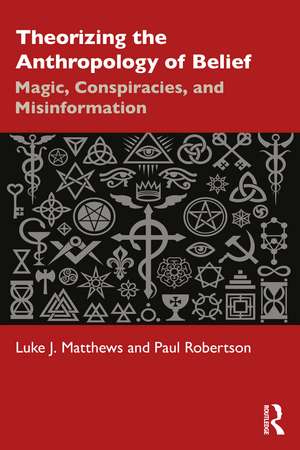Theorizing the Anthropology of Belief: Magic, Conspiracies, and Misinformation
Autor Luke J. Matthews, Paul Robertsonen Limba Engleză Paperback – feb 2024
The first part of the book examines different methods for generating valid anthropological knowledge and proposes a shift in current consensus. Drawing on Western scholars of antiquity and the medieval period and moving away from 20th-century theorists, it argues that we must first make ontological assumptions about the kinds of things that can exist (or not) before we can then develop epistemologies that study those kinds of things. The book goes on to apply the ontology-first theory to a set of case studies in modern day conspiracy theories, misinformation, and magical thinking. It asserts that we need to move away from unneeded metaphysical assumptions of conspiracy theories being misinformation and argues that reconstructing particular historical events can be a fruitful zone for application of quantitative methods to humanistic questions.
Theorizing the Anthropology of Belief is an excellent supplementary suitable for upper-level undergraduate and graduate courses in anthropological theory.
| Toate formatele și edițiile | Preț | Express |
|---|---|---|
| Paperback (1) | 308.75 lei 6-8 săpt. | |
| Taylor & Francis – feb 2024 | 308.75 lei 6-8 săpt. | |
| Hardback (1) | 996.79 lei 6-8 săpt. | |
| Taylor & Francis – feb 2024 | 996.79 lei 6-8 săpt. |
Preț: 308.75 lei
Nou
Puncte Express: 463
Preț estimativ în valută:
59.08€ • 61.76$ • 49.93£
59.08€ • 61.76$ • 49.93£
Carte tipărită la comandă
Livrare economică 06-20 martie
Preluare comenzi: 021 569.72.76
Specificații
ISBN-13: 9781032420325
ISBN-10: 1032420324
Pagini: 106
Ilustrații: 6 Tables, black and white; 6 Line drawings, black and white; 6 Illustrations, black and white
Dimensiuni: 156 x 234 x 11 mm
Greutate: 0.2 kg
Ediția:1
Editura: Taylor & Francis
Colecția Routledge
Locul publicării:Oxford, United Kingdom
ISBN-10: 1032420324
Pagini: 106
Ilustrații: 6 Tables, black and white; 6 Line drawings, black and white; 6 Illustrations, black and white
Dimensiuni: 156 x 234 x 11 mm
Greutate: 0.2 kg
Ediția:1
Editura: Taylor & Francis
Colecția Routledge
Locul publicării:Oxford, United Kingdom
Public țintă
Academic and PostgraduateRecenzii
“What happens when philosophy of science is applied to the murky worlds of magic, conspiracy, misinformation, alien abduction, and recovered memories? Desperately needed clarity! Matthews and Robertson show us why anthropology must integrate scientific and humanities approaches if we are to banish the murk.”
– Wesley J. Wildman, Professor of Philosophy, Theology, and Ethics, Boston University
“Truth matters. But how do we know what is true? From anthropology to physics and everything in between, everything hinges on the answer. Matthews and Robertson take a deep dive into the history of scientific and humanistic thought to answer one of the most profoundly important questions of all times.”
– Dimitris Xygalatas, Associate Professor of Anthropology and author of Ritual: How Seemingly Senseless Acts Make Life Worth Living
– Wesley J. Wildman, Professor of Philosophy, Theology, and Ethics, Boston University
“Truth matters. But how do we know what is true? From anthropology to physics and everything in between, everything hinges on the answer. Matthews and Robertson take a deep dive into the history of scientific and humanistic thought to answer one of the most profoundly important questions of all times.”
– Dimitris Xygalatas, Associate Professor of Anthropology and author of Ritual: How Seemingly Senseless Acts Make Life Worth Living
Cuprins
1 The Bidirectional Relationship of Ontology and Epistemology
2 Bidirectionality in the “Ontological Turn” in Anthropology
3 Bidirectionality of Ontology-Epistemology in the Western Tradition
4 Evolution, Biological Anthropology, and Archeology in Ontological Perspective
5 Quantitative Cultural Analysis within Ontological Uniqueness
6 The Scientific Study of Low-Verifiability Beliefs
7 An Ontology of Anthropology as Both Science and Humanities
2 Bidirectionality in the “Ontological Turn” in Anthropology
3 Bidirectionality of Ontology-Epistemology in the Western Tradition
4 Evolution, Biological Anthropology, and Archeology in Ontological Perspective
5 Quantitative Cultural Analysis within Ontological Uniqueness
6 The Scientific Study of Low-Verifiability Beliefs
7 An Ontology of Anthropology as Both Science and Humanities
Notă biografică
Luke J. Matthews is a senior social scientist at the RAND Corporation. An anthropologist, Luke has studied social networks of primates, evolution of religion, and cultural processes in healthcare, social policy, and national security. Most recently, his interests center on blending ontological and evolutionary theories to understand misinformation.
Paul Robertson is Senior Lecturer in Classics & Humanities at the University of New Hampshire. An expert in religion and the ancient Mediterranean, he has published books on early Christianity and Greco-Roman thought (2016), theorizing religion (2019), and tracing the history of Western selfhood through the myth of the Cyclops (2022).
Paul Robertson is Senior Lecturer in Classics & Humanities at the University of New Hampshire. An expert in religion and the ancient Mediterranean, he has published books on early Christianity and Greco-Roman thought (2016), theorizing religion (2019), and tracing the history of Western selfhood through the myth of the Cyclops (2022).
Descriere
This book explores both scientific and humanistic theoretical traditions in anthropology through the lens of ontology. Suitable for upper-level undergraduate and graduate courses in anthropological theory.
